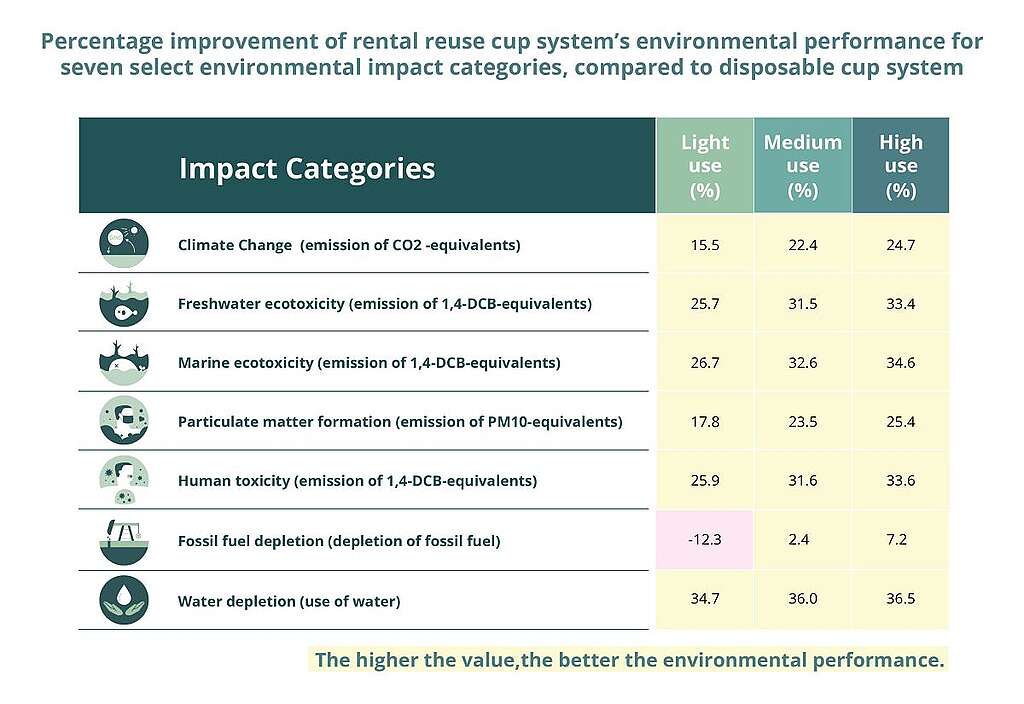Greenpeace Unveils First Study on the environmental performance of East Asia's Rental Reuse Cup System: Reuse saves more resources than disposable including the recycled
Calls on leading restaurant chains to adopt Reuse Systems for waste and carbon reduction
[Hong Kong, 7 November 2023] — In collaboration with research teams from Hong Kong University of Science and Technology (HKUST) and City University of Hong Kong, Greenpeace has conducted a comprehensive study titled "Reusable is Futurable." This research marks the first Life Cycle Assessment (LCA) of single-use cups and rental reuse cup systems based on data of various existing service providers in East Asian cities, Busan, Hong Kong, Taipei, and Tokyo, to reveal their environmental impact.
The research findings for Hong Kong show that the rental reuse cup system out-performed disposable cups in 13 out of 16 environmental impact categories1; in average each use of a reuse cup reduces greenhouse gas emissions by 25%, water consumption by 37%, and human toxicity by 34%. Greenpeace further analyzed that if 6 major chain restaurants2 in Hong Kong switched to a reuse system similar to that outlined in the study to replace their disposable cups, it would not only save over 220 million disposable cups annually3, but also save a basket of environmental resources (Table 1) compared to disposable cups.
Leanne Tam, Greenpeace campaigner states, "This study demonstrated that reuse cups are more resource-efficient and cause less pollution, compared to paper and recycled plastic cups. The third session of the United Nations Global Plastic Treaty which will be held next week has already mentioned a reuse rate target. Relying solely on recycling as policy and ESG key performance indicator is outdated. Greenpeace invites chain restaurants in Hong Kong to implement reuse systems, hence enabling them to proactively address the second phase of disposable plastic tableware regulations by the HK government."
The "Reusable is Futurable" study spanned one year and analyzed data from reuse cup service providers in four East Asian cities, comparing them to single-use paper cups and recycled or virgin PET cups4, using industry-standard LCA methodologies. LCA calculates the environmental impact generated throughout the entire life cycle from "cradle" to "grave", from production, transportation, use to final disposal of single-use and reuse cup systems. In this study, apart from analyzing and comparing the environmental impacts of the rental reuse cups system, it was found that the production stage of disposable cup systems accounts for the lion's share of emissions. Even using recycled plastic as raw material input for disposable plastic cups cannot change the significantly large amounts of natural resources consumed and the array of adverse emissions caused during the production process. Furthermore, when considering a low usage reuse system modeling , the washing process of the reuse cup system generally contributed more than a half of the total environmental impact. Based on the scenario modeling findings, washing facilities of high efficiency are factors to reduce the key impact sources of the reuse cup system. Moreover the short transportation distances in urban areas and cities have high potentials to optimize logistics for cup collection and redistribution.
Dr. Meike Sauerwein from the Division of Environment and Sustainability at HKUST explains, "Even more environmental resources can be saved and emissions avoided as the utilization of the system and each cup goes up (such as more consumers choosing rental cups over disposable ones). Stores with high sales volume have greater potential to ensure a high turnover and full utilization of such reuse systems, thus further help to reduce carbon emissions and save water resources."
Greenpeace introduced and implemented the "Borrow-and-Return Cup Program" in 2022, collaborated with over 35 coffee shops, so far saving 8,000 disposable cups and with a return rate of 99%, and demonstrated the feasibility of reusable utensil systems. The Food and Beverage Industry can learn from this report and the experiences of Hong Kong's "Borrow-and-Return Cup Program". Greenpeace provides the following specific recommendations:
For businesses:
i) Pilot a reuse system, with an emphasis on the Food & Beverage sector and pre-packaged items, by 2024's year end.
ii) Publicly disclose the materials and quantities used in product packaging. It is recommended that companies calculate and disclose their waste reduction volume, reuse rate, and recycling volume separately.
iii) For the Food & Beverage sector, set clear timeline and milestone to achieve 100% reuse target on takeaway food and beverages by 2030
iv) For the retail sector, set a clear timeline and milestone to achieve a 50% reuse target on pre-packed items by 2030.
For the government:
i) Empower start-up reuse providers with earmarked funding, inspiring corporations to incorporate reuse practices in daily operations, especially those at larger scales or in public venues.
ii) Incentivize reuse practices with Producer Responsibility Schemes (PRS). Beyond recycling rates, reward businesses that integrate reusable packaging solutions in their operations.
iii) Introduce milestones and timelines towards the target of reducing 50% single-use packaging or products, and migrate to a reuse system by 2030
"Reusable is Futurable"(Hong Kong Summary):
For reuse system images from other East Asian regions, please visit: https://shorturl.at/filqt
Table 1:

Media Contact
| Leanne Tam Greenpeace Campaigner Email: [email protected] Tel: 2854 8337 |
Chloe Chan Greenpeace Communications Officer Email: [email protected] Tel: 2854 8376 |
1 Using basic technological equipment and dedicated logistics vehicles, the calculation was made that with 40 stores equipped with 10,000 reuse cups, each cup being reused around 40 times per year, it is estimated that they can replace 1,126,286 disposable cups in 3 year
2 The 6 surveyed chain restaurants are McDonald's, KFC, Maxim's MX, Café de Coral, Starbucks, and Pacific Coffee
3 Greenpeace Hong Kong estimated data based on market research and on-site surveys conducted in October this year
4 50% PE-line paper cups and 50% recycled plastic cups were the base for the model of disposable cup system


